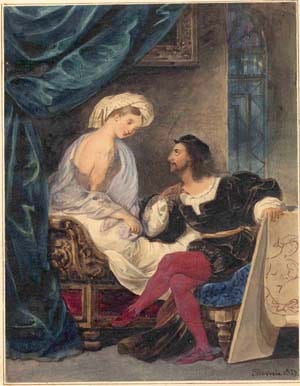« Return to Sir Philip Sidney
Sonnet XCI from Sidney’s Astrophil and Stella
Stella, while now by honor’s cruel might, (A)
I am from you, light of my life, mis-led, (B)
And that fair you, my Sun, thus overspread (B)
With absence’ veil, I live in sorrow’s night; (A)
If this dark place yet show like candle light (A)
Some beauty’s piece, as amber-color’d head, (B)
Milk hands, rose cheeks, or lips more sweet, more red, (B)
Or seeing jet’s black but in blackness bright. (A)
They please, I do confess; they please mine eyes, (C)
But why? Because of you they models be, (D)
Models such be wood globes of glist’ring skies. (C)
Dear, therefore be not jealous over me, (D)
If you hear that they seem my heart to move. (E)
Not them, oh no, but you in them I love. (E)
Sonnet XCI from Sidney’s Astrophil and Stella
Stella, while now by honor’s cruel might, (A)
I am from you, light of my life, mis-led, (B)
And that fair you, my Sun, thus overspread (B)
With absence’ veil, I live in sorrow’s night; (A)
If this dark place yet show like candle light (A)
Some beauty’s piece, as amber-color’d head, (B)
Milk hands, rose cheeks, or lips more sweet, more red, (B)
Or seeing jet’s black but in blackness bright. (A)
They please, I do confess; they please mine eyes, (C)
But why? Because of you they models be, (D)
Models such be wood globes of glist’ring skies. (C)
Dear, therefore be not jealous over me, (D)
If you hear that they seem my heart to move. (E)
Not them, oh no, but you in them I love. (E)
 |
| Lovers in 16th Century Costume |
Analysis
- In “Sonnet 91” by Sir Philip Sidney, Astrophil and Stella are separated from one another. Astrophil misses Stella immensely. He experiences much sorrow. In this poem, he warns Stella not be jealous of him seeing or interacting with other attractive women because whenever he looks at them, all he can see is her. He loves that the features of other women remind him of the one he truly has eyes for, which is Stella. Astrophil compares Stella to the sun, saying that without her, he is living in complete darkness.Astrophil also says that the beauty he sees in other women is only small portion of light given to him compared to the light (metaphorically speaking) Stella gives him. Within this poem, Sidney uses very controlled language to describe the effect of seeing Stella in other women. Sidney appears to have Astrophil only be fixated on Stella’s appearance, but that is not entirely true since Astrophil loves Stella for more than just her external appearance. With Stella absent, it is easier for Astrophil to focus on her appearance because he misses her general presence, but once Stella comes back he would probably be able to focus on her personality traits more. Poets of the renaissance, such as Sidney, sought to display contradictory states of emotion involved in love (example: tenderness and bitterness). Sidney does a good job of displaying contradictory states by appearing like he has interests in pursuing other women just based on how he described how beautiful their features were, when really he is in love with Stella. Within this poem, he really makes a huge distinction between lust and true love, which often contradict each other.
Italian Sonnet
- Sonnet 91 is an Italian (or Petrarchan) sonnet.The Italian (Petrarchan) sonnet is composed of an octave (an 8-line stanza) and a sestet (a 6-line stanza). The standard rhyme of an Italian sonnet is abba abba in the octave and a varying rhyme scheme in the sestet (possible rhyme schemes include cde cde or cdc dcd). The octave states a problem, while the sestet resolves the problem. For example, in sonnet 91, Sidney states Astrophil’s problem of missing Stella and seeing other women instead of Stella within the octave. In the sestet, Sidney leads Astrophil to reveal that he does get pleased to see how beautiful other women can be, but that is only because he sees that they share features of Stella, making her absence feel less painful to him. The turning point of the poem is at line 10, where Sidney has Astrophil reveals why he take pleasure in admiring the beauty of other women. He says, “But why? Because of you they models be” where Sidney claims back Astrophil’s title as a faithful and devoted partner.
Globe
- An example of literary awareness that pertains to culture within “Sonnet 91” is when Sydney writes from Astrophil’s perspective, saying “Models such be wood globes of glist’ring skies”. In that line, Sydney compares the beauty of the women he sees to wooden globes, with painted constellations and planets. “Astrophil and Stella” was published in the 1580s, approximately 130 years after Martin Behaim, a German cartographer, made the oldest globe existing today. The globe was made in 1450.
- Works Cited:
- – “Italian Sonnet.” Merriam Webster.com. Merriam-Webester,n.d,Web. 8 Dec.2013.
- – Mannley, LaZinnia. “”History of Earth Globes.” Ezine articles. N.p., 19 Dec. 2007. Web. 8 Dec.2013
- – “Sonnet 91.” Sidney, Philip. poemhunter.com., n.d. Web. 8 Dec 2013
- – Vincent, Caitlin. Kissel, Adam ed. “Astrophil and Stella Study Guide : Summary and Analysis of Sonnets 76-100”. Gradesaver. 19 September 2007. Web. 8 December 2013.
